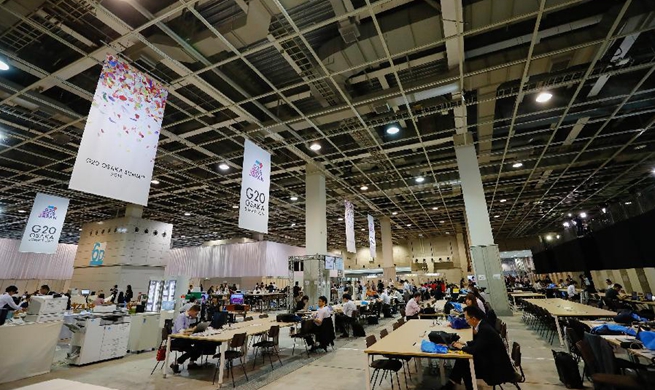OSAKA, Japan, June 27 (Xinhua) -- Ahead of the upcoming 14th Group of 20 (G20) summit in Japan's Osaka, environmental and energy issues have been brought into spotlight, while climate change and marine plastic pollution are expected to be high on the agenda.
During the G20 Ministerial Meeting on Energy Transitions and Global Environment for Sustainable Growth in Japan's Nagoya Prefecture on June 15-16, a joint communique was released, creating an international framework that aims at establishing voluntary measures to reduce plastic pollution in the ocean, under which each G20 member will need to report progress on its measures and make effort to reduce waste plastic under each other's supervision.
Japanese Prime Minister Shinzo Abe has said that tackling plastic waste in the ocean is one of the key issues at the G20 summit in Osaka, during which Japan plans to seek consensus on the goal of zero plastic waste disposed into the ocean by 2050. In a gesture of effort to reduce plastic pollution, the media center at the G20 summit in Osaka does not offer drinks in plastic bottles.
According to the World Wide Fund for Nature, more than 300 million tons of waste plastic is produced every year, of which about 8 million tons ends up in the sea and finally breaks down to form plastic particles.
The World Economic Forum also warned that if the situation did not change, the total weight of plastic in oceans worldwide could exceed the total weight of marine fish by 2050. Scientific researches have shown that marine plastic pollution not only harms ocean species, but also affects the global ecosystem, which has become a global environmental problem.
At present, many countries around the world are taking measures to control plastic pollution in the ocean. The Canadian government has announced that it will ban disposable plastic products starting from 2021. The move follows a decision by vote by the European parliament to ban the use of a number of disposable plastic products.
The G20 members, which account for two-thirds of the world's population, 85 percent of global gross domestic product and 80 percent of global trade, are seen as an important force in tackling climate change.
At the 13th G20 summit in Buenos Aires, Argentina last year, all parties reached consensus on tackling climate change which will continue to be a major issue at the Osaka summit. However, Japan, as the host of the summit, has raised concerns by taking into account the U.S. position on the issue of climate change.
Japan's Kyodo News Agency reported Tuesday that the Osaka summit's draft declaration on global warming emphasizes accelerating the virtuous cycle of environmental and economic growth, achieving development while curbing greenhouse gas emissions, and promoting technological innovation.
However, in terms of the Paris agreement on climate change, wording such as "reaffirming that the agreement is irreversible" and "fully implemented" in last year's declaration was not included, which, according to Kyodo, will likely be seen as a step backwards, sparking criticism inside and outside Japan.
The draft, however, will continue to be negotiated by participating states. French President Emmanuel Macron has said that his country will not accept a summit declaration that does not mention the Paris climate agreement.













